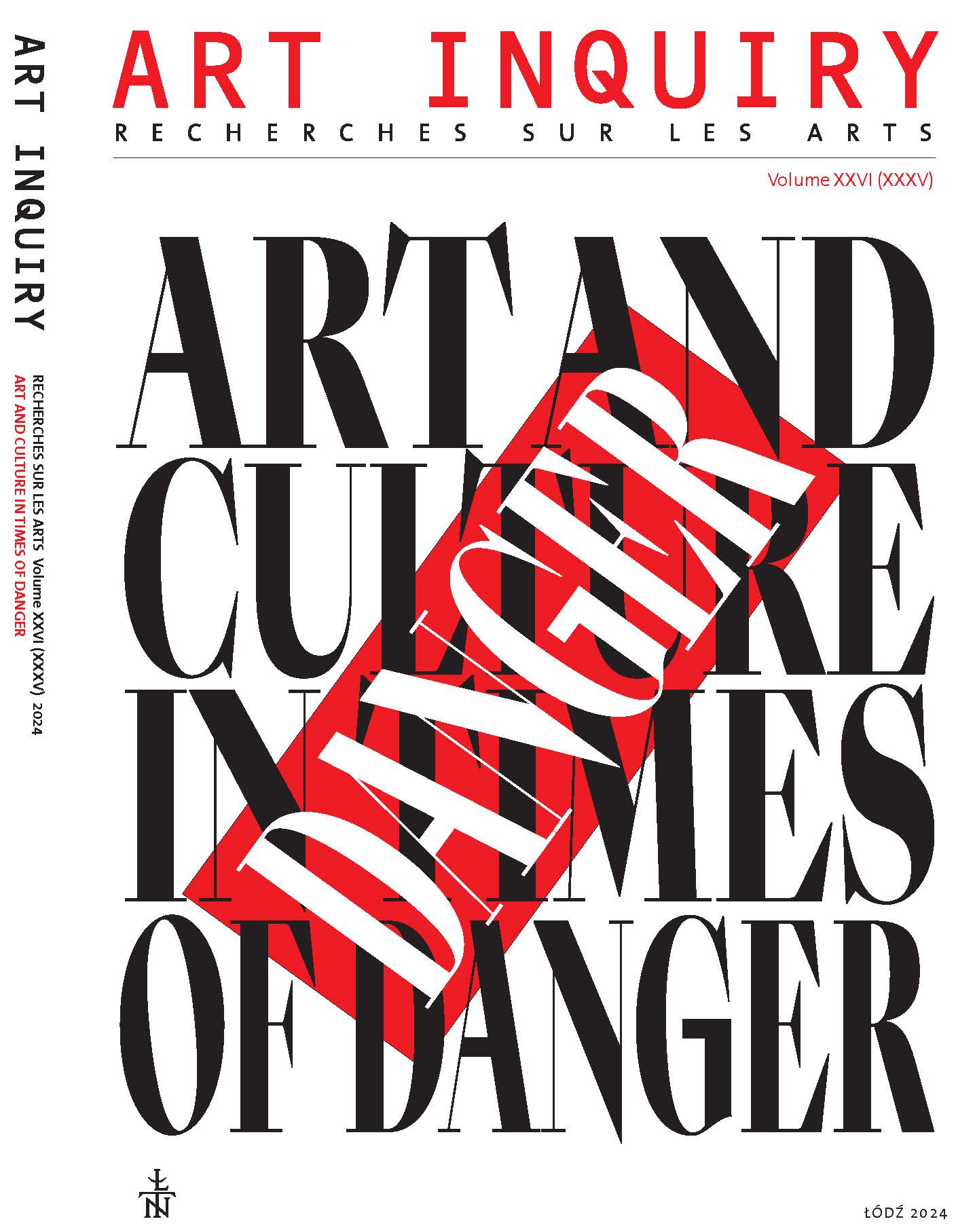Jane Jin Kaisen’s works as the practice of exploring history, memory and trauma
DOI:
https://doi.org/10.26485/AI/2024/26/14Keywords:
Korean shamanism, post-memory, art as intervention, Jane Jin KaisenAbstract
The text refers to the artistic practice of Jane Jin Kaisen, a visual artist born on the Korean Jeju Island, but living and working in Copenhagen. The starting point is her exhibition at esea contemporary in Manchester (2024), during which she showed works such as Halmang (2023), Of the Sea (2013) and The Woman, the Orphan, and the Tiger (2010). Balancing between multiple worlds, she portrays in them political histories and collective memories inextricably linked to individual stories. Returning as an adult to her home island, the artist here grapples with one of the most “silenced” events in modern Korean history. She “uncovers” colonialism, including not only the Japanese occupation and subsequent American domination, but also the phenomenon of transnational adoption to Western countries. In doing so, she evokes the world of haenyeo (women of the sea) and shamanic practices, while juxtaposing popularised memories of her grandfather and traditions of her grandmother/mother. One of her main motivations seems to be to explore the ways in which trauma from previous generations is passed on to the present and how to heal. Her ambiguous status as an adoptee and granddaughter of a Survivor makes it possible to evoke Marianne Hirsh's category of “post-memory” and the strategy of reviving and collecting stories, as Ernst van Apphen understands it. Jane Jin Kaisen is interested in revealing complexity rather than creating linear narratives, as she declares that she lacks concrete memories, which makes her turn to archival material. In this context, her practice can be assessed as a search for a trace or “ghost form” of history that needs to be redeemed and evoked in the present through shamanic rituals. In other words, in this way, she “frames and illuminates the sore spots”, demonstrating the invigorating function of art in dealing with tragic events.
References
A conversation between Cecilia Widenheim and Jane Jin Kaisen, in: Dissident Translations, ed. J. J. Kaisen, exh. cat., Århus Kunstbygning, Århus 2011.
van Alphen Ernst (2019) Krytyka jako interwencja. Sztuka, pamięć, afekt, ed. K. Bojarska, transl. K. Bojarska, R. Sendyka, M. Szubartowska, Ł. Zaręba, Kraków: Wydawnictwo Uniwersytetu Jagiellońskiego.
Asseman Jan (2016) Pamięć kulturowa. Pismo, zapamiętywanie i polityczna tożsamość w cywilizacjach starożytnych, transl. A. Kryczyńska-Pham, Warszawa: Wydawnictwo Uniwersytetu Warszawskiego.
Chłosta-Zielonka Joanna (2020) Postpamięć czy pamięć indywidualna? Doświadczenie zagłady zobrazowane w reportażu Agaty Tuszyńskiej pt. Bagaż osobisty po marcu, “Acta Neophilologica”, 2 (XXII), pp. 123–136.
Curtis Francesca (2024) Jane Jin Kaisen: Halmang, “Burlington Contemporary”, https://contemporary.burlington.org.uk/reviews/reviews/jane-jin-kaisen-halmang (accessed 17.06.2024)
Forbes-Carbines Frances (2024) What to Do During a Period of Enforced Silence?, “ArtReview”, https://artreview.com/jane-jin-kaisens-halmang-esea-manchester (accessed 17.06.2024).
Hilty Anne (2011) Jeju shamans, healing minds and hearts. Shamanism as folk psychology, “Jeju Weekly”, https://www.jejuweekly.com/news/articleView.html?idxno=2196 (accessed 17.06.2024)
Hirsch Marienne (2010), Żałoba i postpamięć, transl. K. Bojarska, in: Teoria wiedzy o przeszłości na tle współczesnej humanistyki, ed. E. Domańska, Poznań: Wydawnictwo Poznańskie, pp. 247-280.
Hong Seunghei Clara (2024) Ghostly Imaginings and Alternative Reckonings in Reiterations of Dissent, in: Korean Film and History, ed. Hyunseon Lee, London and New York: Routledge.
Ikeuchi Yasuko (2011) The Woman, The Orphan, and The Tiger – Voices and Narratives Opening Up a Site of Contestation, in: Dissident Translations, ed. J. J. Kaisen, exh. cat., Århus: Århus Kunstbygning.
Kaisen Jane Jin (2019) Delinger, sår og heling, interviewed by Rune Gade, https://kunsten.nu/journal/delinger-saar-og-heling (accessed 19.06.2024).
Kaisen Jane Jin (2021) Korean-Danish artist explores histories of diasporic subjects through lens of Jeju shamanism, interviewed by Park Han-sola, “The Korea Times”, https://www.koreatimes.co.kr/www/art/2024/06/398_313345.html (accessed 19.06.2024).
Kaisen Jane Jin (2021) Praksisbaserede kunstforskere VI: Jane Jin Kaisen: Grænser og oversættelse på anden vis, interviewed by Stine Nørgaard Lykkebo, https://kunsten.nu/journal/praksisbaseredekunstforskere-vi-jane-jin-kaisen-graenser-og-oversaettelse-paa-anden-vis (accessed 19.06.2024).
Kaisen Jane Jin (2022) The Woman, The Orphan, and the Tiger: Jane Jin Kaisen Disentangles Korean History Through Art, interviewed by Lisy Kwon, https://far-near.media/stories/the-woman-the-orphan-and-the-tiger-jane-jin-kaisen-disentangles-korean-history-through-art (accessed 15.06.2024).
Karikis Mikhail (2013) The Breath Sound of Sea Women, https://arteeast.org/quarterly/the-breath-sound-of-seawomen (accessed 17.06.2024).
Ko Alice, Nien-pu, The Translator and the Medium: In Conversation with Jane Jin Kaisen, 24.11.2021, http://www.heath.tw/nml-article/the-translator-and-the-medium-a-conversation-withjane-jin-kaisen/?lang=en (accessed 19.06.2024).
Koh Dong-Yeon (2022) The Postmemory Generation and Being Abandoned: Jane Jin Kaisen’s Film Community of Parting, “Journal of History of Modern Art”, No. 51, pp. 157-189.
Koo Youngeun (2019) ‘We Deserve to Be Here’: The Development of Adoption Critiques by Transnational Korean Adoptees in Denmark, “Anthropology Matters”, Vol. 19 No. 1, pp. 35-71.
Kwak YoonKyung (2018) Pushing away from their own nation? South Korean women married to migrant husbands from developing countries, “Ethnic and Racial Studies”, Volume 42, Issue 7, pp. 1186-1203.
Lee Nami, Kim Eun Young (2017), A Shamanic Korean Ritual for Transforming Death and Sickness into Rebirth and Integration, “International Journal of Humanities and Social Science”, Volume 7, No. 5, pp. 75-80.
Russett Natalie (2024) Jane Jin Kaisen: Halmang, https://corridor8.co.uk/article/jane-jin-kaisenhalmang (accessed 17.06.2024).
Sang-Hun Choe (2023) World’s Largest ‘Baby Exporter’ Confronts Its Painful Past, “The New York Times”, https://www.nytimes.com/2023/09/17/world/asia/south-korea-adoption.html (accessed 11.06.2024).
Sakamoto Rumi (2021) The Women's International War Crimes Tribunal on Japan's Military Sexual Slavery: A Legal and Feminist Approach to the “Comfort Women” Issue, “New Zealand Journal of Asian Studies”, Volume 3, Issue 1, pp. 49-58, https://www.nzasia.org.nz/uploads/1/3/2/1/132180707/comfortwomen.pdf (accessed 11.06.2024).
Shaikh Marwah (2024) A Comprehensive Study on the Haenyo of Jeju Island: Tradition, Sustainability, and Women's Empowerment, “International Journal for Multidisciplinary Research”, Volume 6, Issue 1, January-February, https://www.ijfmr.com/papers/2024/1/12322.pdf (accessed 18.06.2024).
Trenka Jane Jeong (2009) Fugitive Visions: An Adoptee’s Return to Korea, Saint Paul: Graywolf Press.
Ubertowska Aleksandra (2013) Praktykowanie postpamięci. Marianne Hirsch i fotograficzne widma w Czernowitz, “Teksty Drugie”, No. 4, pp. 269-289.
Więckowski Robert (2017) Postpamięć krytyczna w narracjach potomków ocalonych z Szoa (J. Dres, M. Grynberg, G. Rossenberg), “Politeja”, 2 (47), pp. 63-72.
Downloads
Published
Issue
Section
License
Copyright (c) 2024 Łódzkie Towarzystwo Naukowe

This work is licensed under a Creative Commons Attribution 4.0 International License.



